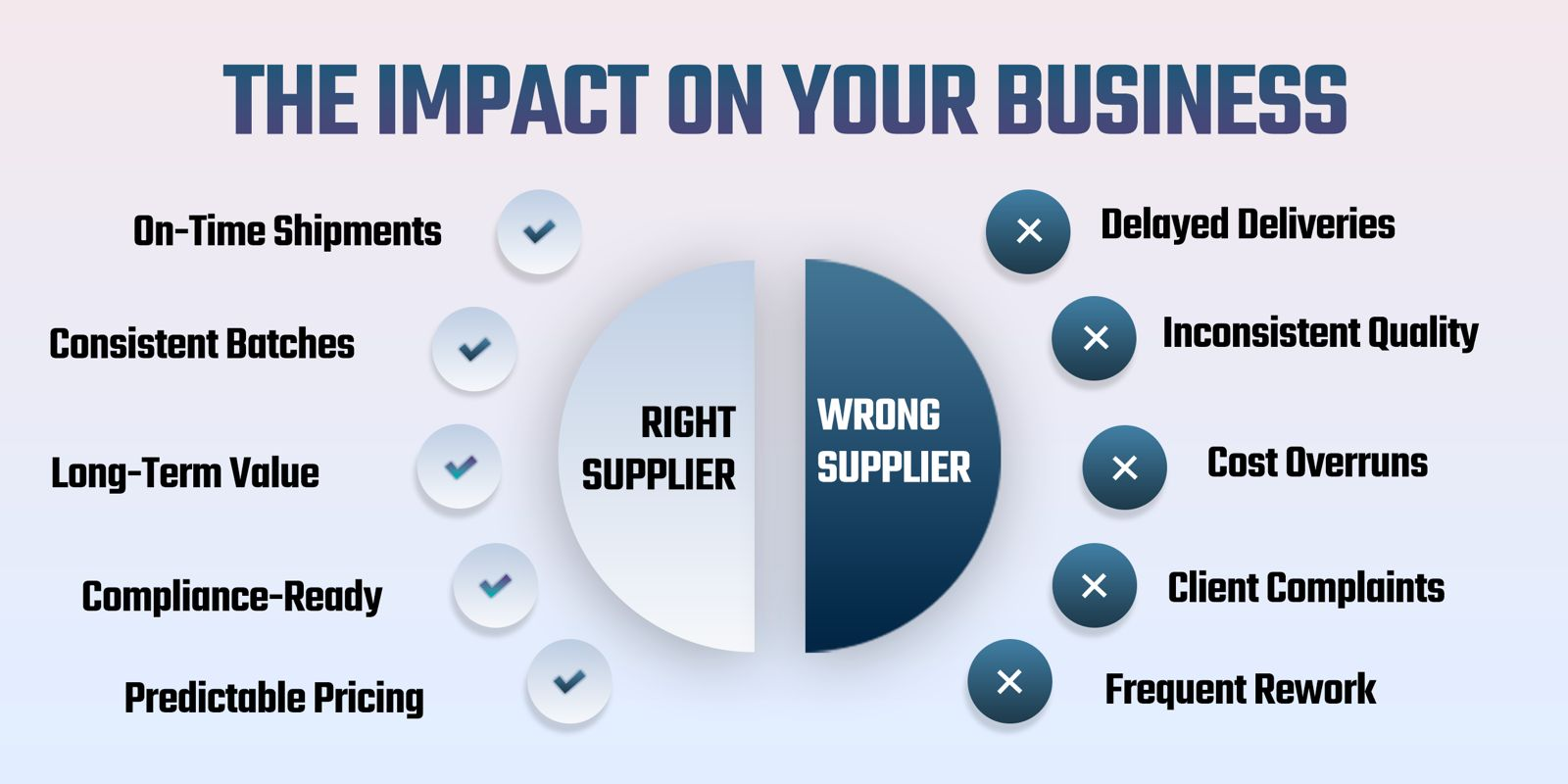Akanksha Sharma 2025-10-07
Let's be honest, if you're in manufacturing, your choice of raw material supplier can make or break your product. And when it comes to rubber? The stakes are even higher.
Rubber compounds aren't just black and bouncy. They're chemically complex, performance-critical, and highly sensitive to even the smallest changes. One inconsistent batch can derail your production, delay your timelines, or worse, lead to rejected products.
So, if you're looking for a reliable industrial rubber material supplier in India, you're in the right place. This blog will walk you through exactly what to look for, with no fluff, just the facts (and a few practical tips).
Let's set the record straight: picking a rubber supplier isn't about who gives you the cheapest quote.
You're choosing a partner who influences:
And guess what? According to a 2024 report by McKinsey, 70% of manufacturing delays are linked to issues in the supply chain, not internal processes. (1) That includes poor raw materials, late deliveries, and supplier miscommunication.
So yes, it's a big decision. But don't worry. We're breaking it down for you.
Before you even talk about pricing or timelines, ask yourself this: Is the material good enough for your product?
Look for suppliers who:
Still unsure? Ask them to share recent batch test results. If they hesitate, that's a red flag.
Stat to know: Inconsistent rubber batches account for nearly 35% of production rework costs in the automotive components sector. (2)
The best suppliers don't just drop off the rubber and disappear.
They guide you through:
Look for a supplier who has an in-house warehouse. Because when a problem shows up on your line, you want answers, not excuses.
Let's talk logistics. Even the best materials are useless if they don't arrive on time.
Ask:
A 2023 industry study showed that Indian manufacturers lose up to ₹1.2 crore per year on average due to raw material delivery delays. Don't let that be you.
If you're manufacturing for automotive, pharma, defence, or exports, you already know compliance is a big deal.
Your supplier should be able to show:
Pro tip: Ask if their materials meet ASTM D2000 or other industry-specific standards. It's a quick way to separate the serious suppliers from the fly-by-night ones.
Here's the thing: sustainability isn't optional anymore. Whether it's customer demand or regulatory pressure, more businesses are expected to show eco-conscious choices in their supply chain.
So, ask your supplier:
According to Deloitte, 57% of industrial buyers in India are actively seeking sustainable raw material options. Don't get left behind. (3)
We get it. Price matters. But here's the catch: the lowest quote often hides the biggest risk.
Instead of going for the cheapest per kg rate, ask:
Real-world insight: Paying 5% more for a reliable supplier can save you up to 25% in rework, delay, and customer complaint costs.
Would you trust someone just starting out, or someone who's already done it fifty times?
Look for:
And if possible, visit their warehouse or production facility. A walk through their plant can tell you more than a sales brochure ever will.
Last but definitely not least, how responsive are they?
Because let's be honest, a great material is no good if your supplier ghosts you mid-shipment.
Look for:
Fun fact (well, not so fun if it happens to you): 41% of B2B buyers say lack of communication is their biggest frustration with raw material suppliers.
Here's the truth: choosing a rubber chemical supplier in India shouldn't feel like a one-off transaction. It's not just about price quotes and delivery timelines. It's about finding a partner who genuinely understands your business and is committed to helping you grow.
So, don't rush the decision. Ask the tough questions. Look beyond the catalogue. And most importantly, trust your gut.
If you're looking for someone who ticks all the right boxes, quality, reliability, transparency, and experience, Rajshila is a name worth remembering. With decades of industry know-how and a strong track record, they're more than just a supplier. They're the kind of partner that helps your production line run smoother, your end product perform better, and your mind stay at ease.
Because at the end of the day, you deserve more than a vendor. You deserve a partner like Rajshila.
A. Imported rubber materials may offer higher consistency or specialised grades, but they can also come with longer lead times, higher logistics costs, and currency fluctuation risks. Local suppliers, especially trusted ones in India, can provide faster delivery and better on-ground support, plus easier communication and regulatory alignment.
A. You can:
A genuine supplier won't hesitate to provide credentials or proof of past orders.
A. While it may seem like a good way to avoid dependency, managing multiple suppliers can lead to:
If you do go multi-supplier, ensure all sources meet the same spec and maintain clear documentation.
A. Yes, but not all do. Suppliers with technical teams or in-house R&D labs can assist in co-developing custom formulations based on your performance needs. This is especially useful when transitioning to new grades or reducing costs without compromising quality.
A. Ideally, conduct a supplier performance review every 6 to 12 months. Check for:
It's also smart to re-evaluate after major production changes, regulatory updates, or raw material shortages.
A. A solid contract should cover:
This protects both sides and ensures clarity during scale-ups or emergencies.
A. In India, there are some state-level and central incentives for companies that integrate eco-friendly practices, including:
Working with suppliers who share this focus can support your eligibility.
Read more: